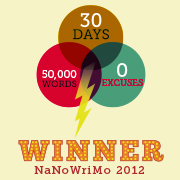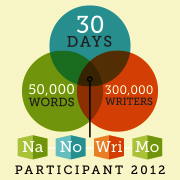[Also published on my blog commonplacebook.com]
Word count for famous novels, in ascending order by number of words. Based on this list compiled by Nicole Humphrey Cook. (Thanks Nicole, and sorry for stealing; I wanted to see the list in order.) For average word counts based on genre, see this handy reference. Also, here’s another list I may swipe and add in here.
Harry Potter Books
Philosopher’s Stone – 77,325
Chamber of Secrets – 84,799
Prisoner of Azkaban – 106,821
Goblet of Fire – 190,858
Order of the Phoenix – 257,154
Half Blood Prince – 169,441
Deathly Hallows – 198,227
Lord of the Rings
The Hobbit – 95,022
The Lord of the Rings – 455,125
The Two Towers – 143,436
The Return of the King – 134,462
Other Famous Books
22,416 – The Mouse and the Motorcycle – Beverly Cleary
30,644 – Charlie and the Chocolate Factory – Roald Dahl
35,968 – Old Yeller – Fred Gipson
36,363 – Lion The Witch and the Wardrobe – C.S. Lewis
42,715 – The Tequila Worm – Canales, Viola
46,118 – Fahrenheit 451 – Ray Bradbury
47,094 – The Great Gatsby – F. Scott Fitzgerald
47,180 – The Red Badge of Courage – Stephen Crane
48,523 – The Outsiders – S.E. Hinton
49,459 – Slaughterhouse-Five – Kurt Vonnegut
50,000 =========== NaNoWriMo Winners
54,243 – The Hours – Cunningham, Michael
56,695 – As I Lay Dying – William Faulkner
56,787 – A Separate Peace – John Knowles
58,428 – The Wind in the Willows – Kenneth Grahame
59,635 – Black Beauty – Anna Sewell
59,900 – Lord of the Flies – William Golding
60,082 – The Dew Breaker – Danticat, Edwidge
61,922 – All Quiet on the Western Front – Erich Remarque
63,422 – Mrs. Dalloway – Virginia Woolf
63,604 – The Scarlet Letter – Nathaniel Hawthorne
63,766 – Brave New World – Aldous Huxley
64,768 – The Martian Chronicles – Ray Bradbury
66,556 – The Color Purple – Alice Walker
66,950 – Treasure Island – Robert Louis Stevenson
67,203 – The Fault in Our Stars – John Green
67,606 – Ironweed – Kennedy, William
67,707 – The Sun Also Rises – Ernest Hemingway
68,410 – Drinking Coffee Elsewhere – Packer, ZZ
69,066 – The Adventures of Tom Sawyer – Mark Twain
70,957 – Woman Warrior – Maxine Hong Kingston
72,071 – White Fang – Jack London
73,404 – The Catcher in the Rye – J.D. Salinger
77,325 – Philosopher’s Stone – JK Rowling
78,462 – The Picture of Dorian Gray – Oscar Wilde
80,398 – The Secret Garden – Frances Hodgson Burnett
82,143 – The Dark Is Rising – Cooper, Susan
82,370 – The English Patient – Michael Ondaatje
82,762 – Anne Frank: The Diary of a Young Girl – Anne Frank
83,774 – Cry, the Beloved Country – Alan Paton
84,799 – Chamber of Secrets – JK Rowling
84,845 – Gilead – Robinson, Marilynne
85,199 – The Unbearable Lightness of Being – Milan Kundera
87,846 – Pere Goriot – Honore de Balzac
87,978 – Persuasion – Jane Austen
88,942 – Nineteen Eighty-Four – George Orwell
89,297 – Waiting – Jin, Ha
91,419 – Joy Luck Club – Amy Tan
92,400 – Song of Solomon – Toni Morrison
95,022 – The Hobbit – J. R. R. Tolkien
97,364 – Anne of Green Gables – Lucy Maud Montgomery
99,121 – To Kill A Mockingbird – Harper Lee
99,277 – All the Pretty Horses – Cormac McCarthy
99,560 – Welcome to the Monkey House – Kurt Vonnegut
100,388 – To Kill A Mockingbird – Harper Lee (count confirmed)
100,609 – Ender’s Game – Orson Scott Card
103,090 – A Distant Shore – Phillips, Caryl
106,821 – Prisoner of Azkaban – JK Rowling
107,349 – Gullivers Travels – Jonathan Swift
107,945 – Wuthering Heights – Emily Bronte
109,571 – The Adventures of Huckleberry Finn – Mark Twain
112,737 – McTeague – Frank Norris
112,815 – The Golden Compass – Philip Pullman
114,634 – Walden – Henry David Thoreau
114,779 – The Tenth Circle – Jodi Picoult
119,394 – Sense and Sensibility – Jane Austen
119,529 – My Sisters Keeper – Jodi Picoult
123,378 – Atonement – Ian McEwan
127,776 – Life on the Mississippi – Mark Twain
128,886 – The Yearling – Marjorie Kinnan Rawlings
130,460 – War Trash – Jin, Ha
134,462 – The Return of the King – J. R. R. Tolkien
134,710 – Schindler’s List – Thomas Keneally
135,420 – A Tale of Two Cities – Charles Dickens
138,087 – Moll Flanders – Daniel Defoe
138,098 – Snow Falling on Cedars – Guterson, David
138,138 – 20000 Leagues Under the Sea – Jules Verne
143,436 – The Two Towers – J. R. R. Tolkien
144,523 – One Hundred Years of Solitude – Gabriel Garcia Marquez
145,092 – A Tree Grows in Brooklyn – Betty Smith
145,265 – Cold Sassy Tree – Olive Ann Burns
145,469 – Last of the Mohicans – James Fenimore Cooper
155,887 – Emma – Jane Austen
155,960 – Oliver Twist – Charles Dickens
156,154 – Watership Down – Richard Adams
157,665 – Alias Grace – Margaret Atwood
159,276 – The Kitchen God’s Wife – Amy Tan
161,511 – Cold Mountain – Charles Frazier
166,622 – Uncle Tom’s Cabin – Harriet Beecher Stowe
169,389 – White Teeth – Zadie Smith
169,441 – Half Blood Prince – JK Rowling
169,481 – The Grapes of Wrath – John Steinback
174,269 – Catch-22 – Joseph Heller
177,227 – The Fellowship of the Ring – J. R. R. Tolkien
177,679 – The Poisonwood Bible – Kingsolver, Barbara
183,349 – Great Expectations – Charles Dickens
183,833 – Little Women (Books 1&2) – Louisa May Alcott
183,858 – Jane Eyre – Charlotte Brontë
186,418 – Memoirs of a Geisha – Arthur Golden
190,858 – Goblet of Fire – JK Rowling
196,774 – The Corrections – Franzen, Jonathan
197,517 – Stones from the River – Hegi, Ursula
198,227 – Deathly Hallows – JK Rowling
198,901 – A House for Mr. Biswas – V.S. Naipaul
206,052 – Moby Dick – Herman Melville
208,773 – Midnight’s Children – Salman Rushdie
211,591 – Crime and Punishment – Fyodor Dostoyevsky
216,020 – The Amazing Adventures of Kavelier and Clay – Chabon, Michael
225,395 – East of Eden – John Steinbeck
236,061 – A Prayer for Owen Meany – John Irving
257,154 – Order of the Phoenix – JK Rowling
260,742 – Cloudsplitter – Banks, Russell
311,596 – The Fountainhead – Ayn Rand
316,059 – Middlemarch – George Eliot
349,736 – Anna Karenina – Leo Tolstoy
364,153 – The Brothers Karamazov – Fyodor Dostoyevsky
365,712 – Lonesome Dove – McMurtry, Larry
418,053 – Gone with the Wind – Margaret Mitchell
455,125 – The Lord of the Rings – J. R. R. Tolkien
561,996 – Atlas Shrugged – Ayn Rand
587,287 – War and Peace – Leo Tolstoy
591,554 – A Suitable Boy – Vikram Seth




